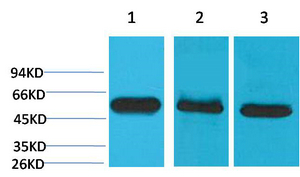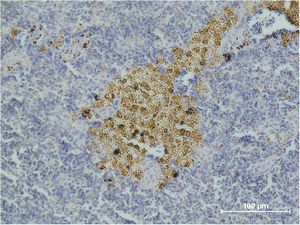

| WB | 咨询技术 | Human,Mouse,Rat |
| IF | 咨询技术 | Human,Mouse,Rat |
| IHC | 1/200-500 | Human,Mouse,Rat |
| ICC | 技术咨询 | Human,Mouse,Rat |
| FCM | 咨询技术 | Human,Mouse,Rat |
| Elisa | 咨询技术 | Human,Mouse,Rat |
| Entrez GeneID | 841; |
| WB Predicted band size | 43,57kDa |
| Host/Isotype | Rabbit IgG |
| Antibody Type | Primary antibody |
| Storage | Store at 4°C short term. Aliquot and store at -20°C long term. Avoid freeze/thaw cycles. |
| Species Reactivity | Human,Mouse,Rat |
| Immunogen | Recombinant Protein |
| Formulation | Purified antibody in PBS with 0.05% sodium azide,0.5%BSA and 50% glycerol. |
+ +
以下是关于Caspase-8抗体的3篇参考文献及其摘要概括:
---
1. **文献名称**:*Involvement of MACH, a Novel MORT1/FADD-Interacting Protease, in Fas/APO-1- and TNF Receptor-Induced Cell Death*
**作者**:Boldin, M.P. et al.
**摘要**:该研究首次克隆了Caspase-8(原名MACH),揭示了其在Fas和TNF受体介导的细胞凋亡中的核心作用。通过特异性抗体,作者验证了Caspase-8与FADD的相互作用,并证明其激活是凋亡信号传递的关键步骤。
2. **文献名称**:*FLICE, A Novel FADD-Homologous ICE/CED-3-like Protease, Is Recruited to the CD95 (Fas/APO-1) Death-Inducing Signaling Complex*
**作者**:Muzio, M. et al.
**摘要**:此研究解析了Caspase-8(原名FLICE)的酶原结构及其在死亡受体复合体(DISC)中的激活机制。通过抗体检测,发现Caspase-8通过其DED结构域与FADD结合,并阐明了其剪切活化过程在凋亡启动中的作用。
3. **文献名称**:*Caspase-8: Regulatory Mechanisms and Therapeutic Potential in Cancer*
**作者**:Salvesen, G.S. et al.
**摘要**:这篇综述总结了Caspase-8在肿瘤发生中的双重角色,包括促凋亡和促生存功能。文中提到多项研究利用Caspase-8抗体检测其在癌症组织中的表达缺失或异常激活,探讨其作为治疗靶点的潜力。
---
以上文献均涉及Caspase-8抗体的应用,涵盖功能验证、结构研究及疾病相关性分析,可为相关实验设计提供参考。
Caspase-8 antibody is a critical tool for studying the role of Caspase-8. a cysteine-aspartic protease involved in apoptosis and necroptosis. Caspase-8. encoded by the *CASP8* gene, is a key initiator protease in the extrinsic apoptotic pathway. It contains two N-terminal death effector domains (DEDs) that facilitate its recruitment to death-inducing signaling complexes (DISCs) formed by activated death receptors like Fas or TNF receptors. Upon activation, Caspase-8 undergoes autocatalytic cleavage, converting from an inactive zymogen (procaspase-8) into active subunits that trigger downstream effector caspases (e.g., Caspase-3/7), leading to apoptosis. Dysregulation of Caspase-8 is linked to cancer, autoimmune disorders, and neurodegenerative diseases.
Caspase-8 antibodies are widely used in research to detect expression levels, activation status (pro-form vs. cleaved forms), and localization via techniques like Western blot, immunohistochemistry, and flow cytometry. They help elucidate mechanisms of cell death, survival signaling, and immune responses. Specificity is crucial, as some antibodies may cross-react with other caspases or isoforms. Researchers must validate antibodies using knockout controls or activity assays. Additionally, Caspase-8 antibodies aid in studying its non-apoptotic roles, such as regulating NF-κB signaling and embryonic development. Proper sample preparation (e.g., avoiding protease degradation) and context-dependent interpretation (cell type, stimuli) are essential for reliable results.
×